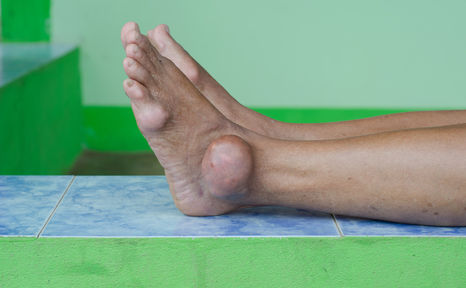

One of the more complex forms of arthritis is gout, which is a variation of inflammatory arthritis that can produce abrupt pain, swelling and tenderness episodes.

One of the more complex forms of arthritis is gout, which is a variation of inflammatory arthritis that can produce abrupt pain, swelling and tenderness episodes. While gout is most often associated with affecting the large joint in the big toe, it can also produce symptoms in the wrists, hands, knees, ankles and feet. Gout attacks are typically isolated to one joint at a time, but if left untreated, it can evolve into a more chronic state and make its presence felt in other areas of the body simultaneously. People living with arthritis should be aware of the common risk factors linked to developing gout so they can reduce their chances of suffering from this ailment.
Gout develops when an excess of uric acid accumulates in your body. Everyone has uric acid in their body, which comes from purines that are produced naturally. However, eating certain foods can increase the amount of uric acid in your body, which can force your kidneys into overdrive in attempt to get rid of it. Foods and beverages that are high in purines include:
• Pork
• Lamb
• Beef
• Canned tuna
• Shrimp
• Lobster
• Liquor
• Beer
If your diet often includes these types of foods and beverages, you're consistently putting your body at a heightened risk for gout. While uric acid buildups aren't entirely dependent on your diet, those who deal with symptoms of arthritis should try to reduce consumption of these possible gout triggers as much as possible.
If you have a family member who has had gout, you are automatically at a higher risk for developing inflammatory ailments as well. According to the Arthritis Foundation, nearly 5 percent of adults in the U.S. are living with gout, with men in their 40s and 50s being the predominant demographic for inheriting the condition.
Women tend to naturally have lower amounts of uric acid in their bodies, but after menopause, uric acid levels are also known to increase significantly. Other health conditions that are associated with gout include high blood pressure, high cholesterol, diabetes and heart disease.
There are also a number of medications that have been linked to higher risk of gout. Diuretic medications, which are generally referred to as "water pills" to lower blood pressure, may raise uric acid levels in some cases. Other forms of thiazide diuretics to help treat hypertension tend to increase uric acid levels as well, as could overuse of aspirin.
There are times when it may be hard to distinguish between symptoms of arthritis and gout, but if you notice that pain in a joint becomes severe within 24 hours, it's time to seek out medical attention. When gout goes untreated, the likelihood of the condition developing into a chronic state drastically increases. This is why communication with your physician is crucial.
Arthritis Drugs May Increase Your Risk for Shingles
Bone-Density Tests: When You Need Them — and When You Don't
Psoriatic Arthritis Linked to Obesity, Heart Disease
Copyright © www.orthopaedics.win Bone Health All Rights Reserved